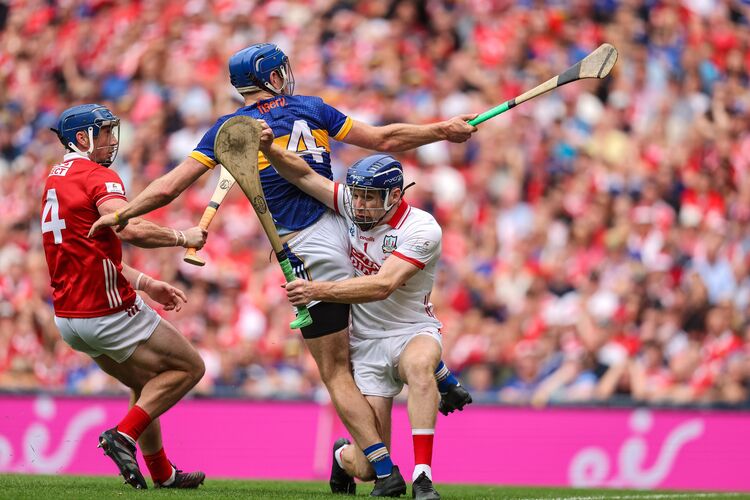If Bill Irwin might profess one secret about the writing of Samuel Beckett, it is that he hasn’t quite got it on the nose. “It’s a bugger of a play,” he says of “Waiting for Godot,” to a trickling, reciprocal chuckle. For a part of his audience last Friday evening, a full house of predestined, adoring onlookers, the punchline of Irwin’s witty confession, on demystifying the work of Ireland’s most humane yet elusive playwright, lay below the understatement. Perhaps for others, the laugh is intuited implicitly from its accuracy. Or maybe it’s not the word they picked him to say.
Whichever reasoning from this lampooning lecturer one might surmise, it is evident that Irwin’s masterful one-man act “On Beckett,” willfully welcomed once again for New York audiences, reveals a fond curiosity for the ambiguities often lost on Beckett. Created and performed solely by Irwin, “On Beckett” goes on, with the association of Octopus Theatricals, in the Francis J. Greenburger Mainstage at the Irish Repertory Theatre playing through Aug. 4.
“On Beckett,” a textual revue revisited, at times memoir, acrobatically refined recitation and buffoonery seminar, is everything that an open invitation into Samuel Beckett ought to be. With the earnestness of a devotee, Irwin presents a procession of Beckett’s texts—among them “Stories and Texts for Nothing,” “The Unnamable,” “Wat” and “Waiting for Godot” — opining and pouring over his thoughts in fractal reflection, between the artist and the words his work returns to.
The performance recapitulates Irwin’s personal connection to the works and words of Beckett, that he seems tethered to them on an imperceptible leash. Whether reminiscing modestly on his life’s memorable productions (accompanied by visions of Robin Williams as Estragon soaring over his head) or wracking his mind upon the purpose of the deleterious words themselves, Irwin finds something indescribable in the text of Beckett that beckons him back.
In this familiar setting (having performed as Clov for Irish Rep’s previous production of “Endgame,” with premonitions to perform it again) Irwin proclaims amid the 90-minute musings that he can’t escape the thought of Beckett; for some reason unsure—infernal or otherwise—Beckett’s words never leave him. The certainty is that whatever provokes Irwin’s need to repeat this production is for his audience an experience anything but hellish.
There is a particular grace that saves Irwin, and his audience, from an excruciating, tedious evening of parsing through the limbo of Beckett’s notoriously terse verbiage, and it isn’t for nothing: Irwin performs only what he can preach. Whether a scholar or skeptic, Irwin brings Beckett to one-and-all, conceding the “not unduly concerned with intelligibility” of speech without undermining the intelligence of what is spoken.
For a work concerning Beckett, Irwin’s warmth and malleability makes the tone of his subject approachable as an introductory course, yet enticing to enthusiasts alike. In simple specificity, Irwin is comprehensive, complete, and compromising.
Unlike many of the more common contrivances of Beckett, this work is neither somber nor serious for the sake of itself, as Irwin’s “useful desire” sharply eschews cliché.
He surrenders to the inarticulate moments, the ironies and reversals and inversions of Beckett’s “precise but indefinable” lives; yet he refrains from forgoing the pursuit of their understanding. Attuned to his audiences’ preconceptions, and ready at the quick with a joke or gag, Irwin is calculated in his ideas but not pedantic, monastic in his vocation to Beckett but not precious. He is intrigued by a “Waiting for Godot” in baseball caps. Irwin, dare one say, makes existentialism seem playful.
As personal this piece is, “On Beckett” is as much a statement on learning to memorize the meaning of living through repetition as it is a testament to the profession most pertinent to Irwin; that life’s most morbid moments are suited on the mouth and posture of a clown. This is the gospel of Beckett according to Bill.
Bearing only a consortium of bowlers, two rectangular blocks, a pair of glasses, a coat and perpetually silly trousers (designed by Charlie Corcoran and costumed by Martha Hally) Irwin takes inimitable form in glib Beckettian style. In the hysteria of his talent, Irwin is an unparalleled craftsman of the American clown.
Through voice, movement, and silhouette, he accentuates the tensions of expectation, and in those tragic contortions, Irwin decries the uncomfortable comedy of incompleteness; mis-stepping with fumbled beginnings and foibles of words, the clumsy clarity of our real life.
In his expressions of human faltering and mocking honesty, Irwin achieves a rare trick, that he somehow makes the dwelling anxieties in Beckett's words more known: Life is a process of beginning between thoughts, stages, and uncertainties. It is from Irwin's portrayal that we rediscover that most profound voice of Beckett— even in our times of lost confidence, when we are at our most vulnerable, we are trying; that we must try.
For the playwright who famously postulated that we may “fail better,” Bill Irwin contemplates, clops, but never flops in this lauded reprisal. For tickets, visit irishrep.org.






